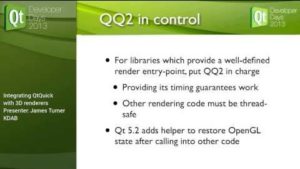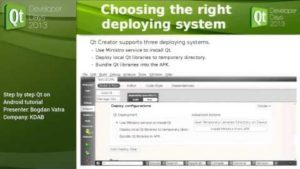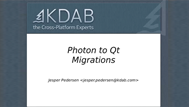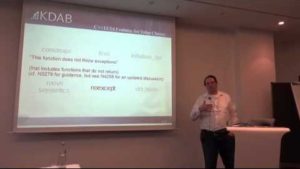Abstract: “QtQuick in Qt5 uses OpenGL to deliver fluid, performant visuals, and an internal scene-graph structure to permit threaded rendering, decoupling the main application thread from interacting directly with the graphics driver. For developers work with an existing rendering or visualisation technology, this presents both an opportunity but also problems; QtQuick offers a compelling, modern […]
KDAB Blogs Get the RSS Feed
Stay up-to-date and get inspiration from KDAB’s expert insights into Qt, C++ and OpenGL development.
Our engineers and designers share cutting-edge technology news and ideas with regard to Qt, QML, Qt on Android, OpenGL, Qt 3D, Vulkan, Scalable UIs and more embedded, mobile and desktop-related topics.
Running QtQuick Applications on the Web
QML is the language that makes writing Qt application UIs easier than ever before. QmlWeb now brings this ease to the web. Traditionally desktop applications were written in languages like C or C++. Web technologies like HTML and PHP were mainly used to write static websites. With the rise of modern web applications and technologies […]
Improving the speed of C++ applications Fast code matters - Milian Wolff
Qt on Android Tutorial Step by step video tutorial
Qt on Android Tutorial (please adjust volume / low sound): Abstract: The tutorial will start with instructions on how to setup the development environment, how to configure QtCreator and ensuring that all dependencies are met. It will then continue with a live demonstration on creating an app, deploying it to an Android device and […]
Qt Migrations Photon to Qt Migration
http://www.kdab.com/wp-content/uploads/stories/photon_migration.mp4 The Photon to Qt migration framework helps you control the complexity and cost of the migration project. The framework consists of the following parts: a partial implementation of the Photon API in Qt, covering the most important use cases a library of Qt widgets as slot-in replacements for Photon widgets that do not exist […]
Designing modern values in C++ Marc Mutz
by KDAB’s Marc Mutz at Meeting C++ 2014 Abstract: C++11 is now widely available, and so is C++14. Like for users of the language, C++11/14 is a new language for C++ library writers, too. In this talk, we will walk you through the new C++ features that impact class design. We will show guidelines that […]
KDAB joins Khronos and welcomes Vulkan for next generation graphics
We are proud to announce that KDAB is now a contributor member of the Khronos Group, a not for profit, member-funded consortium focused on the creation of royalty-free open standards for parallel computing, graphics and dynamic media on a wide variety of platforms and devices. As a contributor member of the Khronos Group, KDAB is […]
After 3 successful years, KDAB passes on the Qt Developer Days torch
For the last 3 years, we in KDAB have received overwhelmingly positive feedback for organising and running Qt Developer Days in Europe. Now we would like to say thank you to all of you for your participation and positive feedback with regard to our arrangements of everything from great technical content and discussions to evening entertainment […]
Qt3D 2.0 The FrameGraph
Continuing our blog post series about the rewrite of Qt3D. Introduction For quite some time now, you’ve been hearing about Qt3D’s Framegraph. Although a brief definition of what the Framegraph is was given in the previous articles, this blog post will cover it in more detail. After reading this post, you will understand the difference […]
KDAB contributions to Qt 5.7
Last week I visited a new customer who is making medical and industrial devices which have one thing in common: image and video capturing, and letting the user save these files onto a USB key. These devices run embedded Linux and the application is done in Qt (and gstreamer for the video capture). The new […]





